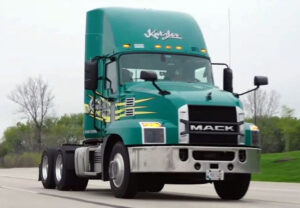FORT LAUDERDALE, Fla. — As with most industries, trucking thrives or lags depending on the nation’s economic health.
In the 2024 Heavy-Duty Asset Fleet Outlook, Brian Holland, president and CEO of Fleet Advantage, says many stakeholders in the transportation fleet industry note the economy as their primary challenge this year.
There are numerous other “hot item” issues to consider — truck parking, fuel prices and emissions regulations, just to name a few.
“Despite these ongoing challenges, it remains an exciting yet pivotal time in the industry,” Holland said. “The companies with transportation fleets that are leveraging a KPI (key performance indicator) driven asset management plan and focusing on shortening their life cycles to create the lowest possible total cost of ownership (TCO) will be the ones that are positioned most competitively at the end of the year.”
At ACT Research, industry experts and analysts say they expect U.S. freight fundamentals to show improvement this year.
“Entering the year, freight demand was below typical trends, but analysts believe it will continue to recover, driven largely by continued consumer spending and subsequent retail sales activity, according to ACT,” Holland said. “What’s more, organizations with private fleets are faring better than for-hire carriers, especially as these businesses face harsher realities of the difficult economy entering 2024.”
Below, Holland outlines a few of the issues he sees as most impactful for the industry.

Strategy planning
Holland says a growing number of economists believe the Fed is feeling a higher level of confidence that inflation is more closely aligned with their target and could begin to lower interest rates as soon as June.
“This would be a sign of relief for those organizations looking to invest in new trucks and equipment, especially as the cost of equipment has become a serious issue for many,” he said. “Immediately following the pandemic, supply chains made availability a major issue. Today it is no longer about availability, and instead more about the cost of entry into new equipment.”
This is why Holland believes fleets must have a strategic, multi-year acquisition plan built around a methodical, disciplined approach to lifecycle management.
“It is a necessity (to have) such a plan that can adapt to changing market conditions, which is designed to inject more flexibility into the decisions for procurement while assigning stronger fundamentals toward managing the organization’s TCO and bottom line,” he noted.
Data and artificial intelligence
Holland says most fleets analyze data sets before making decisions. Artificial intelligence (AI) is also becoming a part of the industry, but without accurate data, AI is basically useless, Holland cautioned. If an AI system is fed inaccurate or skewed data, the results produced by AI will also be inaccurate.
“As pioneers in the use of advanced data and analytics for years, (Fleet Advantage has been) committed to leveraging billions of miles of actual truck operating data that is used to help our fleet clients make business decisions based on models that have been proven out,” he said.
In addition, he says, predictive modeling allows companies to plan out the lifecycles of their fleets.
“We’ve seen that fleets that are leveraging this approach are some of the most competitively aligned in the industry today and ready to weather any changing market conditions,” he said.
Emissions reductions
Eliminating harmful emissions is another issue facing the trucking industry as the U.S. Environmental Protection Agency works to apply stringent regulations and pressure motor carriers to employ heavy-duty electric vehicles (EVs).
“While it’s important to make decisions that lead with sustainability in mind, many fleets today are instead focusing on emissions reduction strategies as opposed to simply going ‘all in’ on alternative fuel technology,” Holland explained. “Clean diesel and even hydrogen are much more in focus today, and they are both playing a significant role in companies’ decisioning for emissions reduction strategies.”
Two years ago, Fleet Advantage conducted a benchmarking survey, asking clients which type of alternative fuel truck fleets they are most interested in. Well over half (65%) of respondents indicated interest in electric trucks, while 15% said hydrogen and 25% opted for compressed natural gas options. When asked to project a viable time frame for converting to trucks powered by alternative fuel sources, 45% said it would take at least five to 10 years.
“Almost one year later, we are seeing those numbers shifting, with 33.3% indicating EV over the next five to seven years (29.6% say another 10 years), and 38.5% indicating hydrogen,” Holland said, adding that the timetable for adopting heavy-duty EVs continues to change.
Helping clients reduce emissions is a task the Fleet Advantage team takes seriously, he says.
“During calendar year 2023, our focus on shorter life cycles helped our clients’ environmental impact by reducing over 303,000 metric tons of CO2,” he said. “This brings our total CO2 reduction of emissions to over 1.3 million metric tons since inception.”
As more legislation is introduced to mandate the movement toward zero-emission vehicles, fleets are monitoring how these mandates may impact near-term plans for buying new trucks and equipment. According to the survey, 59% of respondents are either looking to pre-buy current new models because of CARB regulations or are closely monitoring the situation to decide whether to alter their plans.
Looking ahead
Looking ahead at 2024, Holland says he believes interest rates and cost will continue to be in focus for businesses and fleets.
“They must rely on proven data so they can make smart, informed decisions that will have long-term benefits without financial missteps,” he said. “They must have a larger focus on their business above and beyond what the Fed’s actions are. They must manage their life cycles with the right strategy and multi-year procurement plan.
“With this in mind, fleets will continue to understand that as they improve the performance of their trucks, they will improve the health of their business while also achieving their sustainability measures in 2024,” he concluded.
Born in Pine Bluff, Arkansas, and raised in East Texas, John Worthen returned to his home state to attend college in 1998 and decided to make his life in The Natural State. Worthen is a 20-year veteran of the journalism industry and has covered just about every topic there is. He has a passion for writing and telling stories. He has worked as a beat reporter and bureau chief for a statewide newspaper and as managing editor of a regional newspaper in Arkansas. Additionally, Worthen has been a prolific freelance journalist for two decades, and has been published in several travel magazines and on travel websites.







